Application of Jean Watson's Theory in Nursing Practice
VerifiedAdded on 2021/06/17
|5
|1441
|23
Report
AI Summary
This report delves into Jean Watson's Theory of Human Caring, outlining its foundational principles and practical applications within the nursing profession. It explores the core assumptions, including the importance of interpersonal involvement, the satisfaction of human needs through carative factors, and the promotion of health through effective caring practices. The report examines the philosophical underpinnings of caring science, encompassing the interconnectedness of human beings, health, environment, and nursing. It further elucidates Watson's 10 Carative Factors, redefined as Caritas Processes, emphasizing loving-kindness, authentic presence, spiritual practices, and the creation of a caring environment. The report also discusses the transpersonal concept and the actual caring occasion, highlighting the development of trusting relationships, the integration of carative and curative practices, and the ethical considerations inherent in nursing care. The theory emphasizes the importance of considering patients as whole human beings and incorporating both carative and curative practices to improve the quality of patient care, fostering a healthier society, and improving the dignity of the patient. The report includes references to relevant literature supporting the theory's concepts and practical application.
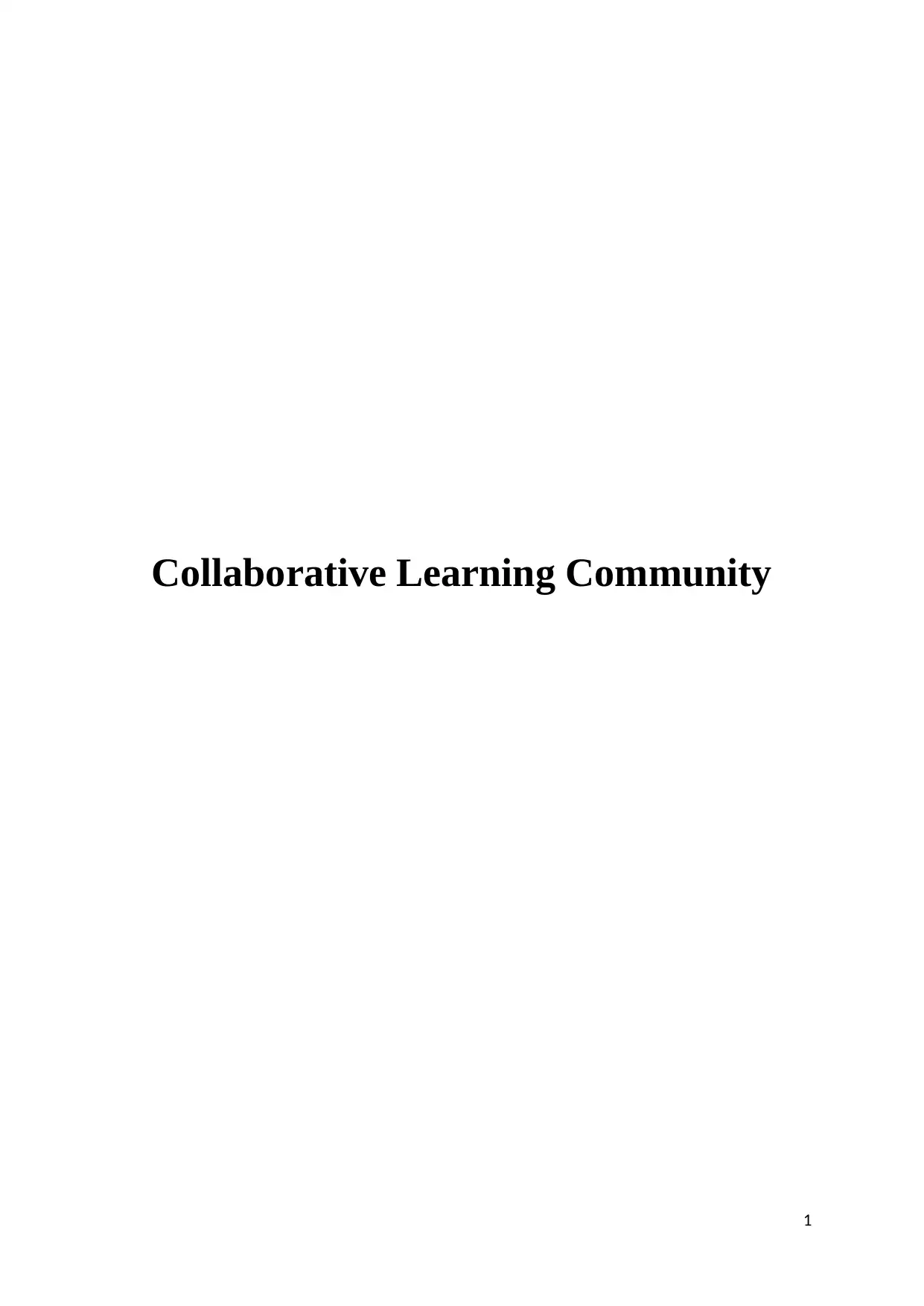
Collaborative Learning Community
1
1
Paraphrase This Document
Need a fresh take? Get an instant paraphrase of this document with our AI Paraphraser
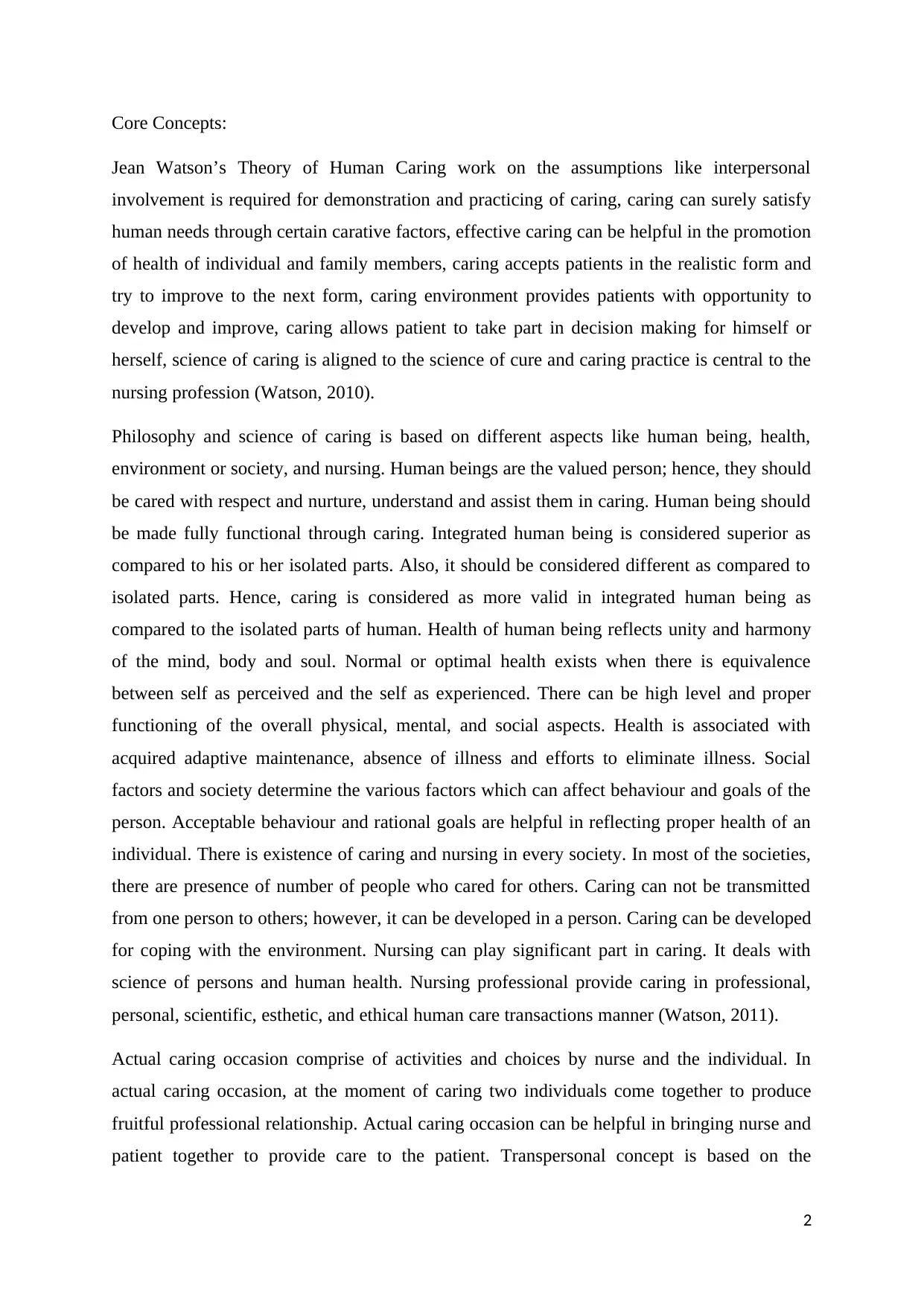
Core Concepts:
Jean Watson’s Theory of Human Caring work on the assumptions like interpersonal
involvement is required for demonstration and practicing of caring, caring can surely satisfy
human needs through certain carative factors, effective caring can be helpful in the promotion
of health of individual and family members, caring accepts patients in the realistic form and
try to improve to the next form, caring environment provides patients with opportunity to
develop and improve, caring allows patient to take part in decision making for himself or
herself, science of caring is aligned to the science of cure and caring practice is central to the
nursing profession (Watson, 2010).
Philosophy and science of caring is based on different aspects like human being, health,
environment or society, and nursing. Human beings are the valued person; hence, they should
be cared with respect and nurture, understand and assist them in caring. Human being should
be made fully functional through caring. Integrated human being is considered superior as
compared to his or her isolated parts. Also, it should be considered different as compared to
isolated parts. Hence, caring is considered as more valid in integrated human being as
compared to the isolated parts of human. Health of human being reflects unity and harmony
of the mind, body and soul. Normal or optimal health exists when there is equivalence
between self as perceived and the self as experienced. There can be high level and proper
functioning of the overall physical, mental, and social aspects. Health is associated with
acquired adaptive maintenance, absence of illness and efforts to eliminate illness. Social
factors and society determine the various factors which can affect behaviour and goals of the
person. Acceptable behaviour and rational goals are helpful in reflecting proper health of an
individual. There is existence of caring and nursing in every society. In most of the societies,
there are presence of number of people who cared for others. Caring can not be transmitted
from one person to others; however, it can be developed in a person. Caring can be developed
for coping with the environment. Nursing can play significant part in caring. It deals with
science of persons and human health. Nursing professional provide caring in professional,
personal, scientific, esthetic, and ethical human care transactions manner (Watson, 2011).
Actual caring occasion comprise of activities and choices by nurse and the individual. In
actual caring occasion, at the moment of caring two individuals come together to produce
fruitful professional relationship. Actual caring occasion can be helpful in bringing nurse and
patient together to provide care to the patient. Transpersonal concept is based on the
2
Jean Watson’s Theory of Human Caring work on the assumptions like interpersonal
involvement is required for demonstration and practicing of caring, caring can surely satisfy
human needs through certain carative factors, effective caring can be helpful in the promotion
of health of individual and family members, caring accepts patients in the realistic form and
try to improve to the next form, caring environment provides patients with opportunity to
develop and improve, caring allows patient to take part in decision making for himself or
herself, science of caring is aligned to the science of cure and caring practice is central to the
nursing profession (Watson, 2010).
Philosophy and science of caring is based on different aspects like human being, health,
environment or society, and nursing. Human beings are the valued person; hence, they should
be cared with respect and nurture, understand and assist them in caring. Human being should
be made fully functional through caring. Integrated human being is considered superior as
compared to his or her isolated parts. Also, it should be considered different as compared to
isolated parts. Hence, caring is considered as more valid in integrated human being as
compared to the isolated parts of human. Health of human being reflects unity and harmony
of the mind, body and soul. Normal or optimal health exists when there is equivalence
between self as perceived and the self as experienced. There can be high level and proper
functioning of the overall physical, mental, and social aspects. Health is associated with
acquired adaptive maintenance, absence of illness and efforts to eliminate illness. Social
factors and society determine the various factors which can affect behaviour and goals of the
person. Acceptable behaviour and rational goals are helpful in reflecting proper health of an
individual. There is existence of caring and nursing in every society. In most of the societies,
there are presence of number of people who cared for others. Caring can not be transmitted
from one person to others; however, it can be developed in a person. Caring can be developed
for coping with the environment. Nursing can play significant part in caring. It deals with
science of persons and human health. Nursing professional provide caring in professional,
personal, scientific, esthetic, and ethical human care transactions manner (Watson, 2011).
Actual caring occasion comprise of activities and choices by nurse and the individual. In
actual caring occasion, at the moment of caring two individuals come together to produce
fruitful professional relationship. Actual caring occasion can be helpful in bringing nurse and
patient together to provide care to the patient. Transpersonal concept is based on the
2
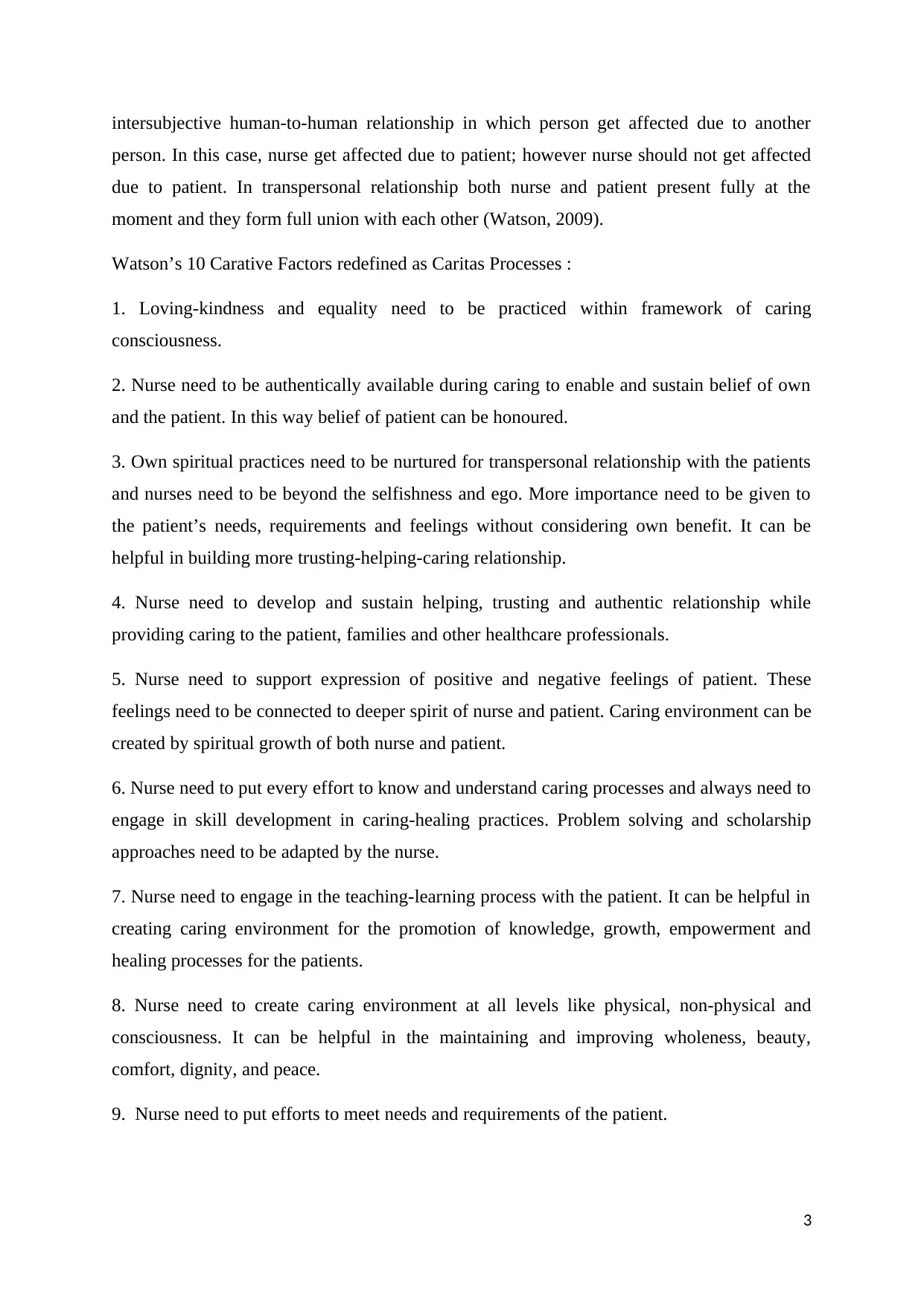
intersubjective human-to-human relationship in which person get affected due to another
person. In this case, nurse get affected due to patient; however nurse should not get affected
due to patient. In transpersonal relationship both nurse and patient present fully at the
moment and they form full union with each other (Watson, 2009).
Watson’s 10 Carative Factors redefined as Caritas Processes :
1. Loving-kindness and equality need to be practiced within framework of caring
consciousness.
2. Nurse need to be authentically available during caring to enable and sustain belief of own
and the patient. In this way belief of patient can be honoured.
3. Own spiritual practices need to be nurtured for transpersonal relationship with the patients
and nurses need to be beyond the selfishness and ego. More importance need to be given to
the patient’s needs, requirements and feelings without considering own benefit. It can be
helpful in building more trusting-helping-caring relationship.
4. Nurse need to develop and sustain helping, trusting and authentic relationship while
providing caring to the patient, families and other healthcare professionals.
5. Nurse need to support expression of positive and negative feelings of patient. These
feelings need to be connected to deeper spirit of nurse and patient. Caring environment can be
created by spiritual growth of both nurse and patient.
6. Nurse need to put every effort to know and understand caring processes and always need to
engage in skill development in caring-healing practices. Problem solving and scholarship
approaches need to be adapted by the nurse.
7. Nurse need to engage in the teaching-learning process with the patient. It can be helpful in
creating caring environment for the promotion of knowledge, growth, empowerment and
healing processes for the patients.
8. Nurse need to create caring environment at all levels like physical, non-physical and
consciousness. It can be helpful in the maintaining and improving wholeness, beauty,
comfort, dignity, and peace.
9. Nurse need to put efforts to meet needs and requirements of the patient.
3
person. In this case, nurse get affected due to patient; however nurse should not get affected
due to patient. In transpersonal relationship both nurse and patient present fully at the
moment and they form full union with each other (Watson, 2009).
Watson’s 10 Carative Factors redefined as Caritas Processes :
1. Loving-kindness and equality need to be practiced within framework of caring
consciousness.
2. Nurse need to be authentically available during caring to enable and sustain belief of own
and the patient. In this way belief of patient can be honoured.
3. Own spiritual practices need to be nurtured for transpersonal relationship with the patients
and nurses need to be beyond the selfishness and ego. More importance need to be given to
the patient’s needs, requirements and feelings without considering own benefit. It can be
helpful in building more trusting-helping-caring relationship.
4. Nurse need to develop and sustain helping, trusting and authentic relationship while
providing caring to the patient, families and other healthcare professionals.
5. Nurse need to support expression of positive and negative feelings of patient. These
feelings need to be connected to deeper spirit of nurse and patient. Caring environment can be
created by spiritual growth of both nurse and patient.
6. Nurse need to put every effort to know and understand caring processes and always need to
engage in skill development in caring-healing practices. Problem solving and scholarship
approaches need to be adapted by the nurse.
7. Nurse need to engage in the teaching-learning process with the patient. It can be helpful in
creating caring environment for the promotion of knowledge, growth, empowerment and
healing processes for the patients.
8. Nurse need to create caring environment at all levels like physical, non-physical and
consciousness. It can be helpful in the maintaining and improving wholeness, beauty,
comfort, dignity, and peace.
9. Nurse need to put efforts to meet needs and requirements of the patient.
3
⊘ This is a preview!⊘
Do you want full access?
Subscribe today to unlock all pages.

Trusted by 1+ million students worldwide
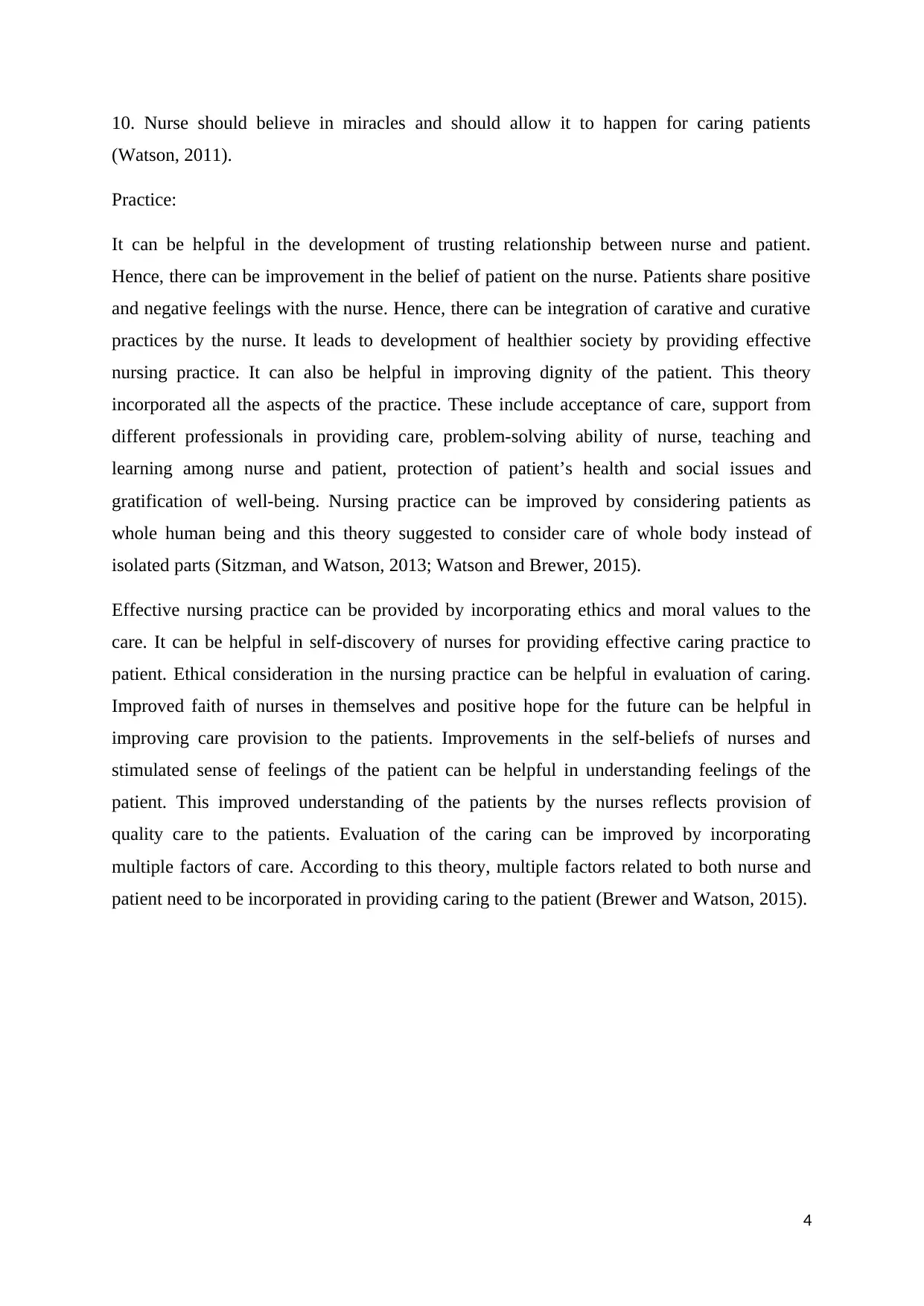
10. Nurse should believe in miracles and should allow it to happen for caring patients
(Watson, 2011).
Practice:
It can be helpful in the development of trusting relationship between nurse and patient.
Hence, there can be improvement in the belief of patient on the nurse. Patients share positive
and negative feelings with the nurse. Hence, there can be integration of carative and curative
practices by the nurse. It leads to development of healthier society by providing effective
nursing practice. It can also be helpful in improving dignity of the patient. This theory
incorporated all the aspects of the practice. These include acceptance of care, support from
different professionals in providing care, problem-solving ability of nurse, teaching and
learning among nurse and patient, protection of patient’s health and social issues and
gratification of well-being. Nursing practice can be improved by considering patients as
whole human being and this theory suggested to consider care of whole body instead of
isolated parts (Sitzman, and Watson, 2013; Watson and Brewer, 2015).
Effective nursing practice can be provided by incorporating ethics and moral values to the
care. It can be helpful in self-discovery of nurses for providing effective caring practice to
patient. Ethical consideration in the nursing practice can be helpful in evaluation of caring.
Improved faith of nurses in themselves and positive hope for the future can be helpful in
improving care provision to the patients. Improvements in the self-beliefs of nurses and
stimulated sense of feelings of the patient can be helpful in understanding feelings of the
patient. This improved understanding of the patients by the nurses reflects provision of
quality care to the patients. Evaluation of the caring can be improved by incorporating
multiple factors of care. According to this theory, multiple factors related to both nurse and
patient need to be incorporated in providing caring to the patient (Brewer and Watson, 2015).
4
(Watson, 2011).
Practice:
It can be helpful in the development of trusting relationship between nurse and patient.
Hence, there can be improvement in the belief of patient on the nurse. Patients share positive
and negative feelings with the nurse. Hence, there can be integration of carative and curative
practices by the nurse. It leads to development of healthier society by providing effective
nursing practice. It can also be helpful in improving dignity of the patient. This theory
incorporated all the aspects of the practice. These include acceptance of care, support from
different professionals in providing care, problem-solving ability of nurse, teaching and
learning among nurse and patient, protection of patient’s health and social issues and
gratification of well-being. Nursing practice can be improved by considering patients as
whole human being and this theory suggested to consider care of whole body instead of
isolated parts (Sitzman, and Watson, 2013; Watson and Brewer, 2015).
Effective nursing practice can be provided by incorporating ethics and moral values to the
care. It can be helpful in self-discovery of nurses for providing effective caring practice to
patient. Ethical consideration in the nursing practice can be helpful in evaluation of caring.
Improved faith of nurses in themselves and positive hope for the future can be helpful in
improving care provision to the patients. Improvements in the self-beliefs of nurses and
stimulated sense of feelings of the patient can be helpful in understanding feelings of the
patient. This improved understanding of the patients by the nurses reflects provision of
quality care to the patients. Evaluation of the caring can be improved by incorporating
multiple factors of care. According to this theory, multiple factors related to both nurse and
patient need to be incorporated in providing caring to the patient (Brewer and Watson, 2015).
4
Paraphrase This Document
Need a fresh take? Get an instant paraphrase of this document with our AI Paraphraser
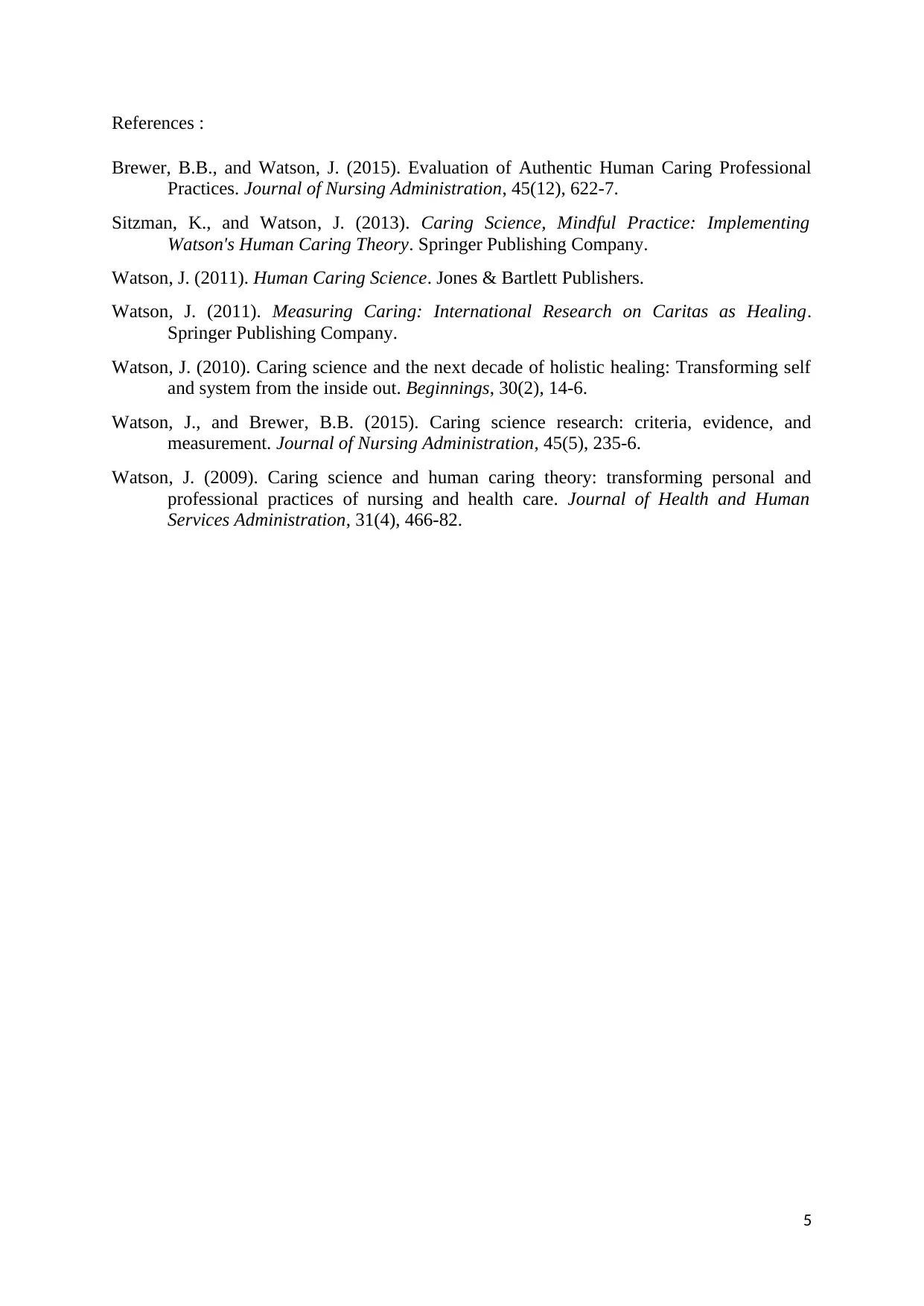
References :
Brewer, B.B., and Watson, J. (2015). Evaluation of Authentic Human Caring Professional
Practices. Journal of Nursing Administration, 45(12), 622-7.
Sitzman, K., and Watson, J. (2013). Caring Science, Mindful Practice: Implementing
Watson's Human Caring Theory. Springer Publishing Company.
Watson, J. (2011). Human Caring Science. Jones & Bartlett Publishers.
Watson, J. (2011). Measuring Caring: International Research on Caritas as Healing.
Springer Publishing Company.
Watson, J. (2010). Caring science and the next decade of holistic healing: Transforming self
and system from the inside out. Beginnings, 30(2), 14-6.
Watson, J., and Brewer, B.B. (2015). Caring science research: criteria, evidence, and
measurement. Journal of Nursing Administration, 45(5), 235-6.
Watson, J. (2009). Caring science and human caring theory: transforming personal and
professional practices of nursing and health care. Journal of Health and Human
Services Administration, 31(4), 466-82.
5
Brewer, B.B., and Watson, J. (2015). Evaluation of Authentic Human Caring Professional
Practices. Journal of Nursing Administration, 45(12), 622-7.
Sitzman, K., and Watson, J. (2013). Caring Science, Mindful Practice: Implementing
Watson's Human Caring Theory. Springer Publishing Company.
Watson, J. (2011). Human Caring Science. Jones & Bartlett Publishers.
Watson, J. (2011). Measuring Caring: International Research on Caritas as Healing.
Springer Publishing Company.
Watson, J. (2010). Caring science and the next decade of holistic healing: Transforming self
and system from the inside out. Beginnings, 30(2), 14-6.
Watson, J., and Brewer, B.B. (2015). Caring science research: criteria, evidence, and
measurement. Journal of Nursing Administration, 45(5), 235-6.
Watson, J. (2009). Caring science and human caring theory: transforming personal and
professional practices of nursing and health care. Journal of Health and Human
Services Administration, 31(4), 466-82.
5
1 out of 5
Related Documents
Your All-in-One AI-Powered Toolkit for Academic Success.
+13062052269
info@desklib.com
Available 24*7 on WhatsApp / Email
![[object Object]](/_next/static/media/star-bottom.7253800d.svg)
Unlock your academic potential
Copyright © 2020–2026 A2Z Services. All Rights Reserved. Developed and managed by ZUCOL.





